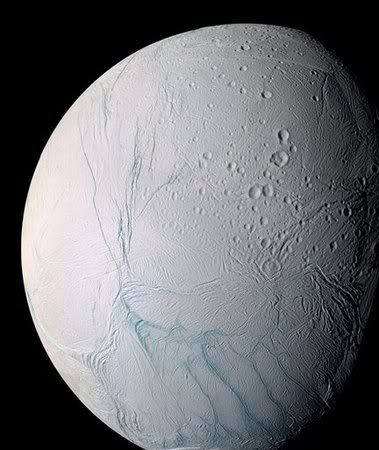With a fresh focus on returning astronauts to Earth's own moon, NASA has squashed several missions that over the next decade were to have continued the search for extraterrestrial life.
Can images from Enceladus, an icy moon located more than 800 million miles from Earth, supercharge interest and funding for life-finding missions?

Probably not any time soon. Missions take years to launch and what enthusiasm NASA has for finding otherworldly life already is focused on Mars and the Jupiter moon Europa, where promising leads have been studied for years.
Even those missions aren't on the fast track. Budget woes last year scrapped a NASA project to send a nuclear-powered spacecraft to Europa, which may hide vast oceans of water under thick ice sheets. The cancellation of a trip to a moon more accessible and hundreds of millions of miles closer than Enceladus doesn't bode well for new projects.
"Anyone who thinks they can squeeze an Enceladus mission into the budget planning is awfully naive," said Bruce Jakosky, an astrobiologist at the University of Colorado, Boulder.
Still, scientists were abuzz over a report last week in the journal Science that showed what seem to be water geysers shooting miles above Enceladus' warm southern pole region. Along with a stable heat source and organic substances, water is believed essential to life.
The tantalizing Enceladus images were snapped by the Cassini spacecraft, an international project managed by NASA's Jet Propulsion Laboratory in Pasadena. Cassini plans at least one more pass by Enceladus, in 2008, which could reveal further details of the moon's potential to harbor life - though not the presence of life itself.
The space agency hasn't ruled out extending that mission, said Andrew Dantzler, director of NASA's solar system division. But any future mission to Enceladus would come after a Europa trip, he said.
"I believe all these great missions that we want to do, we will do," he said. "We just have to space them out."
Extraterrestrial organisms likely would be simple microbes capable of surviving extreme conditions. Not the stuff of movies, but enough to keep some NASA space prospecting programs alive amid the agency's goal of revisiting the moon by 2018.
NASA's proposed budget for fiscal year 2007 would give science projects $5.3 billion, but plans are to limit growth over the next four years to compensate for a $3 billion shortfall in the space shuttle program. Two programs to search for planets beyond the solar system capable of supporting life have been delayed until the middle of next decade.
While unmanned missions are facing a "tough time," the Enceladus discovery should spur interest in the hunt for alien life, said Bruce Runnegar, director of the NASA Astrobiology Institute.
"This is the sort of thing that will help the astrobiology field get stronger and hopefully survive," Runnegar said.
NASA does plan to land two more robotic probes on Mars this decade to search for ancient water and will launch the Kepler spacecraft to look for Earth-sized planets circling other stars.
Astrobiologist Neville Woolf of the University of Arizona would like to see another mission answer whether Enceladus is life-friendly.
"At some point, someone will have the courage and money to look at Enceladus," Woolf said. 'As to when that will be, I'm no wiser than anyone else.'"




No comments:
Post a Comment